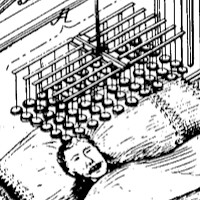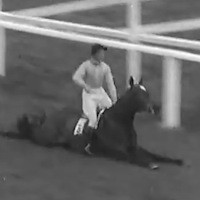Yuri Gagarin is the First Person in Space

In 1961, the United States prepared to launch the first manned space missions—the Mercury Project. Alan Shepard won the spot to be the first man in space. But, technical difficulties plagued the missions and his flight was postponed until May. During the small window of opportunity, the Soviet space program took the lead in the great Space Race. On April 12, 1961, Cosmonaut Yuri Gagarin launched into space, time, and history as the first man in space.
During a time of propaganda and secrets, Yuri Gagarin was carefully chosen and honed to be the hero he became. The saying “some men are born to greatness, others have it thrust upon them,” could not be truer about young pilot. In 1961, Yuri was only 27 years old and still, he had accomplished much. In 1955, he entered a Soviet military flight training school and earned his pilots’ wings two years later. That same year, he married, and earned the rank of Lieutenant of the Soviet Air Force.1 To say the Soviets watched the young pilot would be an understatement. At 5’2”, Gagarin was the perfect height to man a space flight.
In 1960, the Soviets began their selection process for “The One”—their “hero”—to fly the Vostok spacecraft and become the first Russian in space. The selection came down to two men: Gherman Titov and Yuri Gagarin. Both men were smaller in stature and build, both men were smart, both men were excellent pilots. But only one man had the charisma, the personality, and the mental capacity to deal with the media. Yuri Gagarin was handsome, dashing, polite, and above all else, humble. His face was perfect for the propaganda and Soviet Russia chose him.
With the American Mercury program delayed, the Soviets launched themselves into first place by launching Vostok and its pilot, Yuri Gagarin into space. The historical flight lasted 108 minutes,2 much longer than the first and second Mercury missions.
When Yuri returned to Earth, he was no longer Senior Lieutenant Yuri Gagarin; he was Yuri Gagarin, Hero and Icon. The Soviet people fell in love with him and honored him, cherishing his every move. Most men would have loved the attentions and affections, but for Yuri, it was more of a frustration.
Because of his popularity, the government would not allow him another trip into space. It was too dangerous and they did not want to lose their icon. Frustrated, Yuri went back to training in the MiG’s—something many found disturbing. On March 27, 1968, Gagarin and his instructor, Vladimir Seryogin, took off in a MiG-15 fighter plane. The weather was poor and flying conditions were getting worse. After one training run, Seryogin decided they should land. Their landing, however, was less than stellar. Through several investigations and eye-witness accounts, the Soviets discovered that a backwash of turbulence from the afterburners of an Su-11 jet had caused Gagarin to go into an irrevocable spin, crashing into a forest.3 Gagarin was just 34 years old. Only a year and four months later, Neil Armstrong would reclaim the Space Race for the United States by being the first man to walk on the moon.
Many men in history have accomplished much in their short lives. Yuri Gagarin, however, crossed boarders with his courage, his humility, and his ability. He earned respect and admiration of people from all walks of life and from all over the world. If he were alive today, he would most certainly be proud of the accomplishments that he helped to foster.
During a time of propaganda and secrets, Yuri Gagarin was carefully chosen and honed to be the hero he became. The saying “some men are born to greatness, others have it thrust upon them,” could not be truer about young pilot. In 1961, Yuri was only 27 years old and still, he had accomplished much. In 1955, he entered a Soviet military flight training school and earned his pilots’ wings two years later. That same year, he married, and earned the rank of Lieutenant of the Soviet Air Force.1 To say the Soviets watched the young pilot would be an understatement. At 5’2”, Gagarin was the perfect height to man a space flight.
In 1960, the Soviets began their selection process for “The One”—their “hero”—to fly the Vostok spacecraft and become the first Russian in space. The selection came down to two men: Gherman Titov and Yuri Gagarin. Both men were smaller in stature and build, both men were smart, both men were excellent pilots. But only one man had the charisma, the personality, and the mental capacity to deal with the media. Yuri Gagarin was handsome, dashing, polite, and above all else, humble. His face was perfect for the propaganda and Soviet Russia chose him.
With the American Mercury program delayed, the Soviets launched themselves into first place by launching Vostok and its pilot, Yuri Gagarin into space. The historical flight lasted 108 minutes,2 much longer than the first and second Mercury missions.
When Yuri returned to Earth, he was no longer Senior Lieutenant Yuri Gagarin; he was Yuri Gagarin, Hero and Icon. The Soviet people fell in love with him and honored him, cherishing his every move. Most men would have loved the attentions and affections, but for Yuri, it was more of a frustration.
Because of his popularity, the government would not allow him another trip into space. It was too dangerous and they did not want to lose their icon. Frustrated, Yuri went back to training in the MiG’s—something many found disturbing. On March 27, 1968, Gagarin and his instructor, Vladimir Seryogin, took off in a MiG-15 fighter plane. The weather was poor and flying conditions were getting worse. After one training run, Seryogin decided they should land. Their landing, however, was less than stellar. Through several investigations and eye-witness accounts, the Soviets discovered that a backwash of turbulence from the afterburners of an Su-11 jet had caused Gagarin to go into an irrevocable spin, crashing into a forest.3 Gagarin was just 34 years old. Only a year and four months later, Neil Armstrong would reclaim the Space Race for the United States by being the first man to walk on the moon.
Many men in history have accomplished much in their short lives. Yuri Gagarin, however, crossed boarders with his courage, his humility, and his ability. He earned respect and admiration of people from all walks of life and from all over the world. If he were alive today, he would most certainly be proud of the accomplishments that he helped to foster.
You Should Also Read:
First Woman Doctor: Elizabeth Blackwell
Hitler's Angel of Death
Rosenberg Sentencing

Related Articles
Editor's Picks Articles
Top Ten Articles
Previous Features
Site Map
Content copyright © 2023 by Christa Mackey. All rights reserved.
This content was written by Christa Mackey. If you wish to use this content in any manner, you need written permission. Contact Lane Graciano for details.







